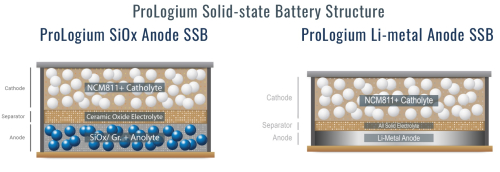ProLogium says it
will start shipping its solid state silicon battery to European car makers for
testing by the end of this year.
The new solid state
battery design with a ceramic electrolyte can nearly double the energy density
of an EV pack while significantly reducing its weight and the number of cells
in pack with increased cell energy says the company.
The Large Lithium
Ceramic Battery (LLCB) format reduces the number of cells and the number of
parallel connections in the battery pack, reducing component and assembly
costs. The flat shape and the excellent thermal conductivity of the solid-state
ceramic electrolyte combined can make the design of pack cooling system much
less complex, thereby optimizing space and saving over 100kg.
“Last year, we
announced the first solid-state battery with 100% silicon oxide anode designed
to enable higher energy density at the cell level. Now, we are pleased to
present the LLCB, another pioneering battery concept that will take EV battery
design to the next level in terms of long range, light weight and design
flexibility,” said Vincent Yang, CEO and founder of ProLogium Technology.
“ProLogium is
currently cooperating with FEV to carry out verification tests of the LLCB and
design applicable solutions. Samples are targeted to be delivered to European
car OEMs for testing as early as the end of 2023,” said Polun Cheng, Global
Project Management AVP of ProLogium Technology. European partners include
Mercedes-Benz.
ProLogium is
setting up its first overseas solid-state battery gigafactory in Dunkirk,
France, in a €5.2bn investment. The total planned capacity of 48 GWh will be
deployed in phases to supply the European EV market. “With a clear roadmap for
capacity ramp-up and technology development, we are making an all-out effort to
accelerate the electrification revolution by providing improved energy solutions
to our partners,” said Yang.
“The LLCB will
enable greater design flexibility for EVs,” said Simon Wu, Assistant Vice
President of ProLogium Technology Product Centre.
“For the same space
as the mainstream 2170 EV battery pack, the LLCB pack’s volumetric energy
density can be nearly doubled, and for the same total energy, the LLCB pack’s
weight can be cut by up to 115 kg,” he said.


No comments:
Post a Comment